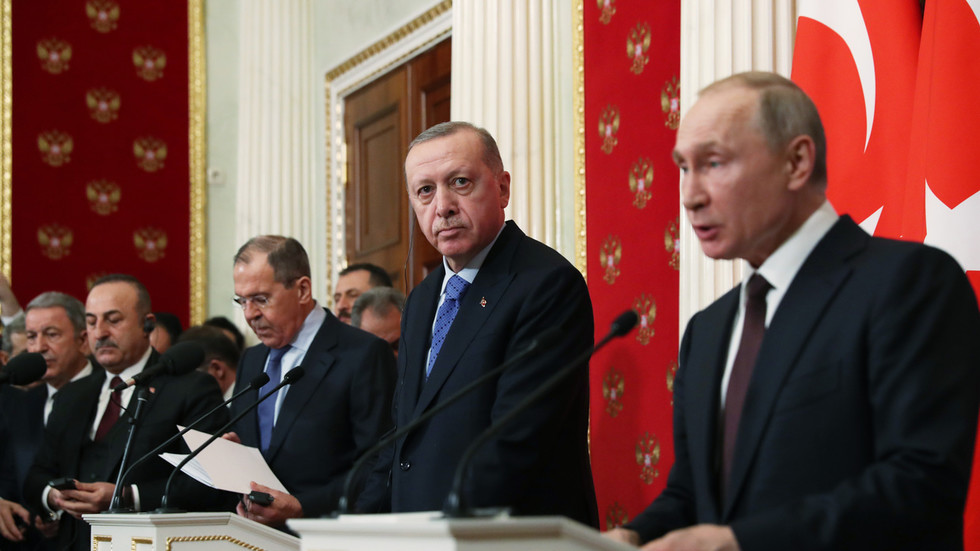Alwaght- Syria’s Idlib province is experiencing “rare calm” after Turkish President Recep Tayyip Erdogan and his Russian counterpart Vladimir Putin have announced a military ceasefire in the war-torn country, after a six-hour meeting in Moscow. The ceasefire agreement allows Damascus to secure two strategic routes running through the militant-held province.
A military source speaking to Russia’s RIA news agency on Friday said the truce, which was implemented at 00:01 am, is being observed and that the situation is “calm” in the province.
Russian President Vladimir Putin and his Turkish counterpart Recep Tayyip Erdogan agreed to a truce in the province on Thursday.
The reports of calm were also echoed by the AFP and the so-called Syrian Observatory for Human Rights (SOHR).
SOHR reported that an exchange of fire took place between the two sides before dawn, but that it did not lead to any casualties or any further clashes.
According to the agreement, joint Russian-Turkish patrols will secure a six-kilometer-wide corridor along the M4 highway connecting the two government-held provinces of Latakia and Aleppo.
The Russia and Turkey’s defense ministers are due to discuss and announce specific details of the plan within a week.
Strategic gains for Damascus as Turkey steps back
Despite ongoing discussions about the details of the truce, the ceasefire has been regarded as a major concession by Turkey, even by observers opposed to the Syrian government.
The ceasefire consolidates recent Syrian military gains in the province, notably the M5 highway linking the capital Damascus to the major cities of Hama, Homs and Aleppo.
The formation of a secure corridor along the M4 highway, currently deep within terrorist lines, also allows Damascus to have access to secure transit between Aleppo and Latakia.
Taking control over these two strategic highways has been regarded as a major objective of the Syrian government’s operations in Idlib.
The M4 highway also runs through major terrorist-held cities such as Jisr al-Shughour, further weakening terrorist influence over the province.
Militants of former al-Qaeda affiliate Hayat Tahrir al-Sham (HTS) have also been excluded from the deal, potentially allowing the Syrian military to continue operations against the Turkish-backed terrorist group.
The truce also underlines Turkey’s failure to reverse recent Syrian military gains. Erdogan had vowed to force Syrian troops to withdraw behind Turkish military observation posts last month.
The observation posts had been set up to monitor the implementation of an earlier de-escalation agreement brokered by Ankara and Moscow.
The Syrian army, however, launched a months-long offensive against foreign-sponsored militants in Idlib on August 5 last year after terrorist forces failed to honor the deal.
Consequently, eight Turkish observation posts previously bordering contact lines between terrorists and Syrian troops currently lie deep within Syria-held territory.
Observers have noted that the vulnerable position of the Turkish outposts have restricted Ankara’s ability to conduct military operations against the Syrian troops in Idlib in fear of possible reprisals.
Turkey’s concessions also come as Ankara has failed to win the support of the North Atlantic Treaty Organization (NATO) for its military operations in Idlib.
Ankara’s call for a no-fly zone over the province has also been largely ignored by European states.
Turkey has since announced that it will no longer stop Syrian refugees from reaching Europe.
Ankara has repeatedly raised the prospect of loosening border controls on immigrants seeking to enter Europe in a bid to force European states to adhere to its demands.
On Friday, however, the Netherlands called for a UN Security Council-imposed no-fly zone on the province that will effectively restrict Syrian operations against terrorists.
The purposed measure has yet to win the support of any UNSC member.
Terrorist offensive repelled hours before truce
Hours before the truce took effect on Friday, terrorist forces launched an offensive against Syrian positions in the southern suburbs of Idlib, the capital of the Idlib province.
The assault was repelled by the Syrian forces, who pounded terrorist positions with rocket and artillery attacks and cut terrorist supply lines.
Syria’s SANA news agency reported that a high number of terrorists were killed in the operation.



























